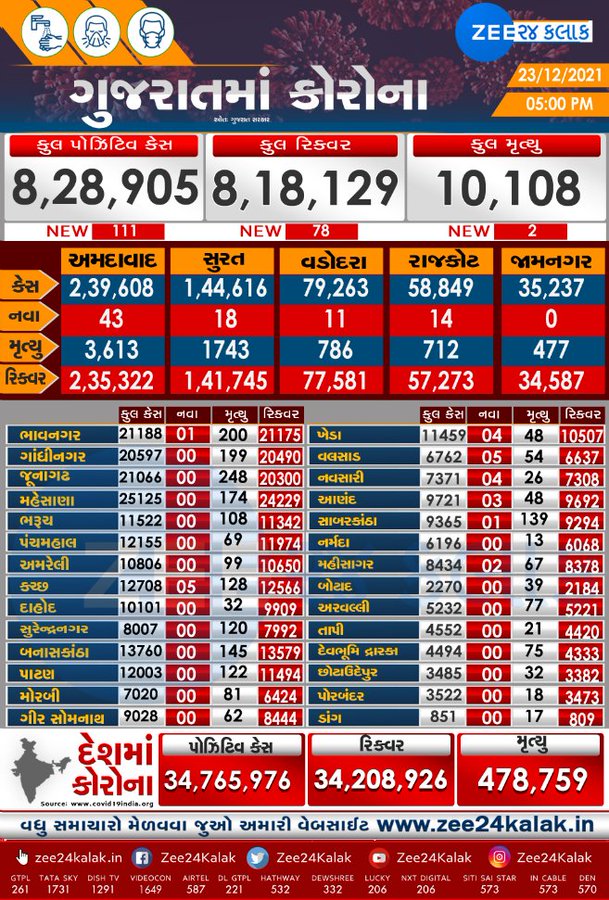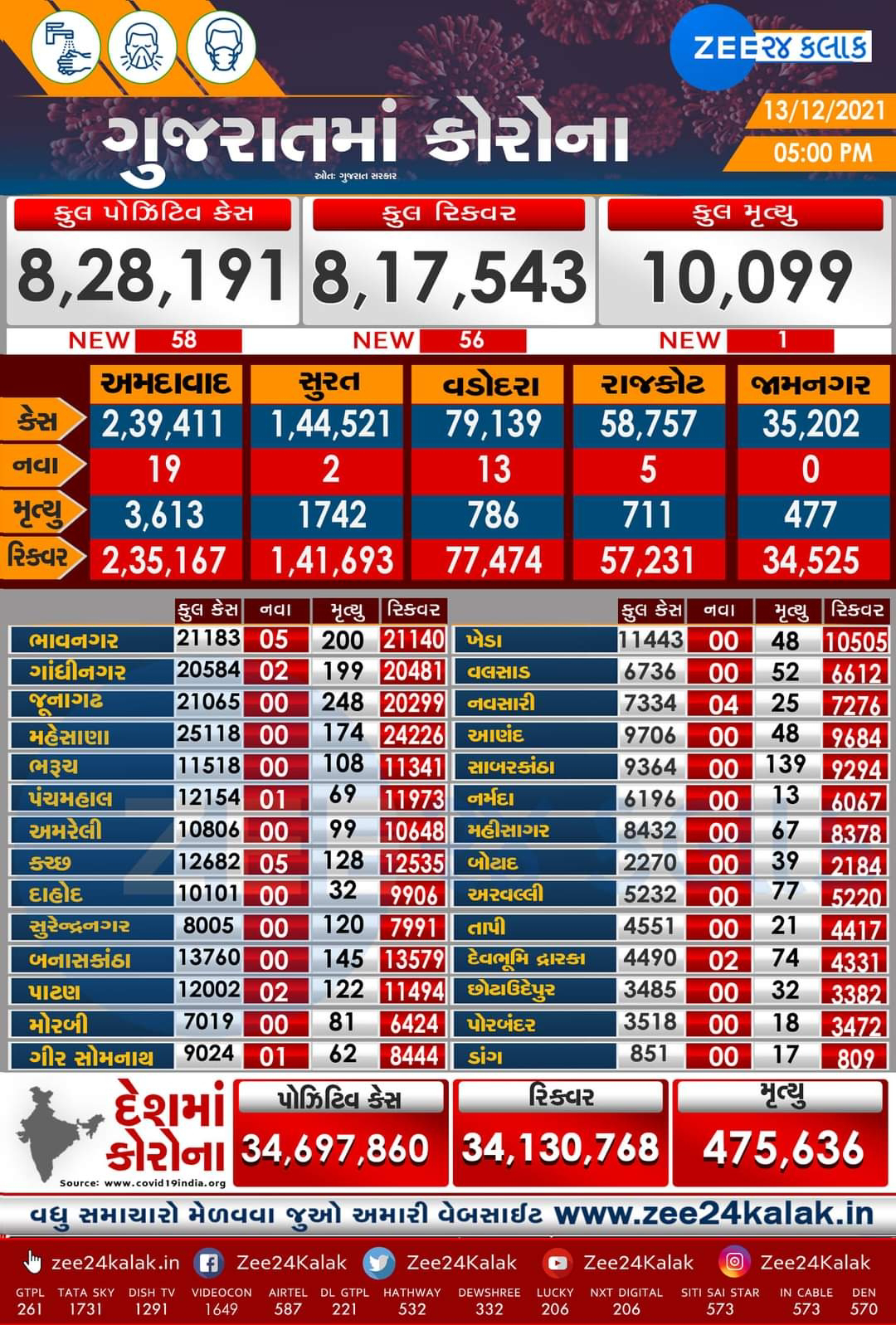GUJARAT CORONA UPDATE.
According to the data released by the Vadodara Municipal Corporation, 75 more cases of corona virus have been reported in Vadodara and city districts today, bringing the total number of positive cases to over 3757. A further 61 patients have been discharged from the hospital in Vadodara today. Thus far a total of 3063 patients have recovered. There are currently a total of 629 active cases in Vadodara, out of which 131 are on oxygen and 37 on ventilator-B pap and 461 patients are in stable condition. The official death toll has risen to 65 from 2 deaths today.
Cases were reported in this area of Vadodara today
City: Vasna Road, Chhani, Harni, Gotri Road, Karelibagh, Sama, Subhanpura, Majalpur, Hathikhana, Makarpura, Kalali, Mandvi, Akota, Tarsali, Mujmahuda, RV Desai Road, Fatehganj, Vaghodia Road, Tandalja, Ajwa Road Danteshwar, Diwalipura, Warsia
Rural: Dabhoi, Sindhrot, Savli, Vaghodia, Undera, Nandesari, Koyli, Sokhada, Padra
Another 16 positive cases were reported in Bharuch today
Cases of corona virus are increasing day by day in Bharuch district. In Bharuch district, 16 more cases of corona virus have been reported today. Of these, 8 cases have been registered in Ankleshwar, 3 in Walia, 2 in Bharuch, 1 in Jambusar, 1 in Zaghadiya and 1 in Wagra. Thus, the total number of positive cases of Coro has reached 681.
The state recorded the highest ever record-breaking 1026 new cases of corona in the last 24 hours. With this, the total number of positive cases in Gujarat has crossed 50 thousand. A further 34 people have been killed in the state. 744 patients have recovered. So far 36403 patients in the state have been discharged after treatment. The total number of infected patients in the state has reached 50465.
In the newly registered cases 225 in Surat Corporation, 187 in Ahmedabad Corporation, 73 in Surat Corporation, 60 in Vadodara Corporation, 45 in Rajkot Corporation, 39 in Dahod, 39 in Bhavnagar Corporation, 25 in Banaskantha, 21 in Surendranagar, 20 in Patan, 19 in Gandhinagar, 19 in Narmada, 19 in Gir Somnath. 18, Mehsana 18, Navsari 17, Panchmahal 17, Bharuch 16, Jamnagar Corporation-16, Vadodara 15, Kheda 14, Rajkot 13, Valsad 13, Ahmedabad 12, Bhavnagar 12, Gandhinagar Corporation 12, Kutch 9, Anand 8, Botad 8, One case has been registered in Amreli 7, Junagadh 7, Mahisagar 6, Morbi 6, Junagadh Corporation-5, Sabarkantha 5, Jamnagar 4, Tapi 4, Porbandar 2, Aravalli 1, Dang 1 and Devbhoomi Dwarka.
According to the health department, 34 more patients have died of Covid-19 in the last 24 hours. Of these, 14 died in Surat Corporation, 4 in Surat, 5 in Ahmedabad Corporation, 2 in Vadodara Corporation, 1 in Ahmedabad, 1 in Bhavnagar Corporation, 1 in Gir Somnath, 1 in Jamnagar Corporation, 1 in Kutch and 1 in Patan. The death toll in the state has reached 2201.
મહત્વપૂર્ણ લિંક
તારીખ 20/1/2022 ના દિવસે આવેલ કોરોના કેસ અપડેટ
07/01/22..
05/01/22.
મહત્વપૂર્ણ લિંક
સાઉથ આફ્રિકામાં મળી આવેલા નવા વેરિયન્ટને નામ અપાયુ ઓમિક્રોન
વિશ્વ આરોગ્ય સંગઠને ચિંતાજનક વેરિન્યટ જાહેર કર્યો
ઓમિક્રોનના લક્ષણો અને તેનાથી બચવાના ઉપાયો
Coronavirus disease (COVID-19) is an infectious disease caused by a newly discovered coronavirus.hospital..
- I do people buy mutual funds?
- What types of mutual funds are there?
- What are the benefits and risks of mutual funds?
- How to buy and sell mutual funds
- Understanding fees
- Avoiding fraud
- Additional information
- Mutual funds are a popular choice among investors because they generally offer the following features:
- Professional Management. The fund managers do the research for you. They select the securities and monitor the performance.
- Diversification or “Don’t put all your eggs in one basket.” Mutual funds typically invest in a range of companies and industries. This helps to lower your risk if one company fails.
- Affordability. Most mutual funds set a relatively low dollar amount for initial investment and subsequent purchases.
- Liquidity. Mutual fund investors can easily redeem their shares at any time, for the current net asset value (NAV) plus any redemption fees.
What types of mutual funds are there?
- Money market funds have relatively low risks. By law, they can invest only in certain high-quality, short-term investments issued by U.S. corporations, and federal, state and local governments.
- Bond funds have higher risks than money market funds because they typically aim to produce higher returns. Because there are many different types of bonds, the risks and rewards of bond funds can vary dramatically.
- Stock funds invest in corporate stocks. Not all stock funds are the same. Some examples are:
- Growth funds focus on stocks that may not pay a regular dividend but have potential for above-average financial gains.
- Income funds invest in stocks that pay regular dividends.
- Index funds track a particular market index such as the Standard & Poor’s 500 Index.
- Sector funds specialize in a particular industry segment.
- Target date funds hold a mix of stocks, bonds, and other investments. Over time, the mix gradually shifts according to the fund’s strategy. Target date funds, sometimes known as lifecycle funds, are designed for individuals with particular retirement dates in mind.
Mutual funds offer professional investment management and potential diversification. They also offer three ways to earn money:
- Dividend Payments. A fund may earn income from dividends on stock or interest on bonds. The fund then pays the shareholders nearly all the income, less expenses.
- Capital Gains Distributions. The price of the securities in a fund may increase. When a fund sells a security that has increased in price, the fund has a capital gain. At the end of the year, the fund distributes these capital gains, minus any capital losses, to investors.
- Increased NAV. If the market value of a fund’s portfolio increases, after deducting expenses, then the value of the fund and its shares increases. The higher NAV reflects the higher value of your investment.
A fund’s past performance is not as important as you might think because past performance does not predict future returns. But past performance can tell you how volatile or stable a fund has been over a period of time. The more volatile the fund, the higher the investment risk.
How to buy and sell mutual funds investors
buy mutual fund shares from the fund itself or through a broker for the fund, rather than from other investors. The price that investors pay for the mutual fund is the fund’s per share net asset value plus any fees charged at the time of purchase, such as sales loads.
Mutual fund shares are “redeemable,” meaning investors can sell the shares back to the fund at any time. The fund usually must send you the payment within seven days.
Before buying shares in a mutual fund, read the prospectus carefully. The prospectus contains information about the mutual fund’s investment objectives, risks, performance, and expenses. See How to Read a Mutual Fund Prospectus Part 1, Part 2, and Part 3 to learn more about key information in a prospectus. Understanding fees
As with any business, running a mutual fund involves costs. Funds pass along these costs to investors by charging fees and expenses. Fees and expenses vary from fund to fund. A fund with high costs must perform better than a low-cost fund to generate the same returns for you.
Even small differences in fees can mean large differences in returns over time. For example, if you invested $10,000 in a fund with a 10% annual return, and annual operating expenses of 1.5%, after 20 years you would have roughly $49,725. If you invested in a fund with the same performance and expenses of 0.5%, after 20 years you would end up with $60,858.
It takes only minutes to use a mutual fund cost calculator to compute how the costs of different mutual funds add up over time and eat into your returns. See the Mutual Fund Glossary for types of fees.












No comments:
Post a Comment